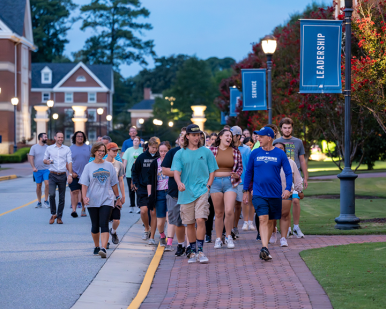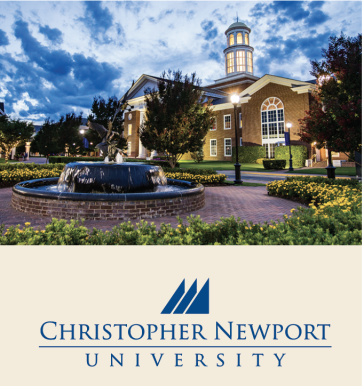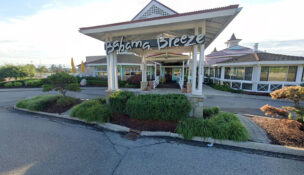
Christopher Newport University President William Kelly and his wife, Angie. Kelly was inaugurated as CNU's sixth president in August 2023.

Christopher Newport University President William Kelly and his wife, Angie. Kelly was inaugurated as CNU's sixth president in August 2023.
Changing of the guard
CNU’s new president aims to grow outreach
Retired U.S. Coast Guard Rear Adm. William G. Kelly covered a lot of ground during his first year as president of Christopher Newport University.
“I wanted to commit myself to listen and learn, so I invited students to walk with me at 6:30 a.m. every single Wednesday,” Kelly says, estimating that about 15 students and faculty members took him up on his offer each week to make the 2-mile trek around the university’s Newport News campus.
One thing that stood out to Kelly from their discussions, he says, was “the quality of the students. Folks were respectful. They asked me, ‘How are you doing?’”
Before taking the helm as Christopher Newport’s sixth president in July 2023, Kelly served as the 42nd superintendent of the U.S. Coast Guard Academy in Connecticut, where, he says, “I truly enjoyed engaging with young people going into the Coast Guard and their families.”
Prior to that, Kelly was stationed with the Coast Guard in Washington, D.C., as an assistant commandant for human resources, responsible for carrying out the armed service branch’s diversity and inclusion strategic plan.
A native of Yonkers, New York, Kelly is himself a 1987 graduate of the Coast Guard Academy and earned his master’s degree in instructional systems design from Florida State University. He and his family moved 15 times during their years with Coast Guard, including a stint in Newport News.
Trible‘s legacy
Much of Christopher Newport University‘s relatively short history occurred during the tenure of former Republican U.S. Sen. Paul S. Trible Jr. CNU’s fifth and longest serving president, Trible led the university for 26 of its 64 years, from 1996 to 2022. (Adelia Thompson, the university’s vice president for advancement, external engagement and the arts, served as interim president between Trible and Kelly.)
Under Trible’s administration, the commuter school was transformed into a residential campus with dormitories, a student union, a theater, a concert hall and a baseball stadium. His key accomplishments included growing the university’s endowment from $300,000 to more than $64 million.
However, Trible’s legacy was also complicated by “a decline in Black presence, both on campus and in the adjacent neighborhood,” according to a December 2023 investigative report from ProPublica, the Virginia Center for Investigative Journalism at WHRO and The Chronicle of Higher Education. Under Trible’s stewardship, the article reported, “the university pursued policies that thinned the ranks of Black students and faculty even as its continuing expansion eradicated a nearby Black community.”
“We have work to do in that area,” Kelly acknowledges. “We need to do better jobs of showing this is a campus you can come to. We need to make sure we are serving all of the community.”
Strained relations between the university and the local Black community can be traced back to the 1960s, when Shoe Lane, a predominantly Black neighborhood, was dismantled to make way for the school’s expansion.
Today, only a handful of Shoe Lane residents remain near and on CNU property. In April, CNU and Newport News Mayor Phillip Jones announced the formation of a joint task force to research Shoe Lane’s removal and assess the impacts of that decision in subsequent decades, according to a CNU news release, with an aim of paving “the way for informed and equitable strategies moving forward.”
One of CNU’s strategic priorities, announced in March, is to “enhance the overall quality of life in Newport News and Hampton Roads” by being a resource “for residents who seek learning opportunities and for organizations who seek assistance in solving complex problems.”
CNU pledged to be a major contributor to the regional economy and workforce and to provide internship and service opportunities for students from the area.
Another new strategic CNU priority is to “create a stronger culture of inclusion” that prepares students to thrive in a diverse, interconnected world.
To that end, Christopher Newport has stepped up its efforts to recruit students both from its neighboring communities and from around the world.
Funded by a grant from the State Council of Higher Education for Virginia, the university is working with 17 high schools in Hampton Roads communities to help low-income and first-generation students make a successful transition to college.
Efforts to recruit students from nearby schools aren’t new, says Dean of Admission Robert J. Lange III. Before Kelly’s arrival, “we were headed in the right direction,” Lange adds, but “I think President Kelly has energized efforts. He’s put his money and authority where his mouth is,” in positioning CNU as a hometown university for the area.
“We’re in every one of those schools. We counsel them through the process. It’s high-touch,” continues Lange. “It’s allowed us to offer direct admission through the Common Application,” a single online form used by more than 900 colleges and universities. Even students who aren’t immediately accepted profit from the experience, he says, because “if you’re not now eligible, it tells you what you can do to become eligible. It demystifies the process.”
CNU’s signature program, he says, is Community Captains, an early admission, two-year college preparatory program for Newport News public high school sophomores.
Applications from these targeted schools, which serve a high number of Pell Grant-eligible students, are up nearly 30% compared with last year, Lange says. The university’s outreach program even includes some area elementary and middle schools.
Expanding reach

Back in the days when Christopher Newport was a commuter school without a residence hall, “‘out-of-state’ used to be Richmond and NOVA,” Lange jokes.
Now CNU is expanding its reach, escalating efforts to attract students beyond Virginia. Kelly has launched a new initiative that, beginning this fall, will provide out-of-state students with scholarships that are competitive with affordable mid-Atlantic private schools, Lange says.
The university has added a second out-of-state recruiter, he says, and is putting together an advisory board to help CNU understand how it is perceived by out-of-staters. “We’re flying in school counselors. We’re visiting feeder schools out of state.”
The university also has formed a partnership with a company that is able to identify the best prospective students, based on test scores and activities. “We offer them conditional admission without them having to go through full applications,” says Lange. “We build their applications.”
As for international students, their numbers at CNU have historically been quite low because “we have never had a sustained international [recruitment] effort,” according to Lange, but “with President Kelly, it is now a priority.”
Under Kelly’s leadership, CNU is in the process of establishing a partnership with a company that helps place foreign students. It can also assist these students post-graduation with visa applications, Lange adds, helping to keep new talent in Virginia.
With all these efforts, Christopher Newport reports it’s on pace to receive a record number of applications for the 2024-25 academic year.
Applications from students seeking to transfer to CNU from Virginia community colleges and other institutions for 2024-25 were up by about 13% over last year as of early July, according to Jim Hanchett, chief communications officer. He declined to specify the number of applications received.
Students of color/first-time college students made up 26.9% of the undergraduate population in 2023-24, Hanchett says. As of early July, the percentage for the coming year is at about 35%.
Solving problems
Another university strategic priority set out in March is to “advance the power and promise of the liberal arts” in a way that helps graduates “solve real world problems.”
One option that helps meet that strategic goal is the President’s Leadership Program (PLP), a four-year, 18-credit minimum leadership studies minor. Courses cover topics such as values and ethics and theories and perspectives on leadership.
PLP was established in 1998, and there are about 1,100 students currently in the program, “which is roughly one-third of the entire student body,” notes PLP Director Lacey Grey Hunter.
Hunter says Kelly been “very, very” involved with the program since his arrival on campus. “One of my favorite things is PL Pizza, where [Kelly has] met with groups of 10 to 15 students to share pizza” and to discuss the university’s direction, Hunter says. “They ask him questions. He asks questions. He is transparent. They’ve asked him about challenges in his own world.”
Kelly has addressed PLP students about “what it is like to follow a common mission,” Hunter adds. “He talked particularly about 9/11” — when Kelly was on Coast Guard duty, standing watch off the ports of New York and Boston following the 2001 attacks — “and what it means to agree, if needed, to give your life for something.”
In June, Kelly welcomed incoming PLP freshmen to campus to take part in the four-day “Leadership Adventure,” in which students participated in leadership development sessions, team-building events and outdoor activities.
Group activities were designed to bring students together to collectively solve problems or achieve a shared group goal, according to Hunter. Examples include rock wall climbing, escape room events,and building a device with limited supplies to protect a raw egg dropped from the third floor.
Leadership Adventure feels like a summer camp, she adds, “because the students are divided up into cabin colors and spend a heck of a lot of time together.”
Getting an edge
CNU also takes pride in becoming the first school in Virginia to offer an undergraduate certification in research and creative activity. The certificate, which requires 12 credit hours of coursework, will be available this fall.
Undergraduate research is one of CNU’s four educational pillars, explains David A. Salomon, director of student research and creative activity. The others include study abroad, internships and service to the community through the school’s CNU Engage program.
The research and creative activity program got off the ground eight years ago, but SCHEV granted its certification this past spring. Now, “it shows up on [students’] transcript,” Salomon says. “Colleges and companies can see the evidence of their experience.”
Students can research any topic, including “the complexities of scientific phenomena, delving into the nuances of historical events, or examining the intricacies of social dynamics,” he says, no matter whether it’s relevant to their majors. The process produces “students who are more marketable from every perspective. It gives them that much more of an edge.”
For the 2022-23 school year, 37% of all undergraduates at CNU engaged in research or creative activity before graduation, surpassing a 30% goal set by CNU, according to Salomon.
It’s not just the academic programs at Christopher Newport that the new president finds impressive, however. Kelly, who played baseball for the Coast Guard Academy, praises the school’s “phenomenal athletics program,” as well.
During Kelly’s first year on campus, 16 teams were represented in NCAA championship events, CNU’s women’s sailing team advanced to nationals, and the university’s cheerleading squad won a national championship.
“The Captains compiled an overall record of 247-78-5, for a winning percentage of .756, the fourth best ever in CNU
athletic history,” according to Director of Athletics Kyle McMullin. What’s more, 21 student athletes received All-American recognition for their academic and athletic accomplishments for the 2023-24 school year.
Kelly spent much of his first year at Christopher Newport listening. His second year as president, he says, will be about strengthening relationships and being “the No. 1 storyteller for the university.”
That story, Kelly says, is going out to “Richmond, to alumni, to community members who want to support something bigger than themselves.” Now is not a time for dramatic transformation, he adds, but a time to “move the university forward. We’re not in the process of having to rebuild. It’s a time to evolve.”
 At a glance
At a glance
Founded
Founded in 1960 as Christopher Newport College, an extension school of William & Mary, Christopher Newport became independent of W&M in 1977 and received university status in 1992. The public university is named for Christopher Newport, the privateer and ship captain who helped establish the first permanent English colony in North America at Jamestown in 1607.
Campus
Christopher Newport university is located in Newport News. Its 260-acre campus features buildings with a mixture of architecture styles, from the Greek- and Roman-inspired Mary M. Torggler Fine Arts Center, with its columns and cascading glass rotunda, to the sleek and modern Ferguson Center for the Arts, a regional venue that has hosted touring Broadway shows and famous performers such as Tony Bennett, John Legend and Liza Minelli.
2023-24 enrollment
4,407 undergraduate students
96 graduate students
2% international undergrads
28% minority enrollment
93% in-state undergrads
Employees
Approximately 285 faculty and 715 staff
Academic programs
Christopher Newport University offers more than 90 areas of study, from fine and performing arts to computer engineering and neuroscience. CNU has traditional two-year graduate programs as well as five-year bachelor’s degree and master’s degree programs in applied physics, computer science, environmental science and teaching.
Tuition, fees, room and board*
In-state residents: $28,711
Out-of-state: $43,348
*2023-24 school year
Source: Christopher Newport University


















